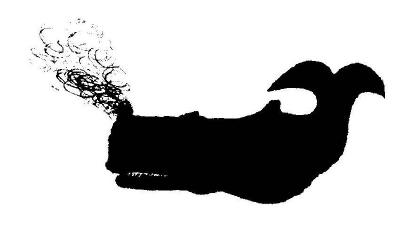|
FRESH STUFF DAILY |
|
|
||
|
|
||
|
|
||
|
SEE ALL SIGNED BOOKS by J. Dennis Robinson click here |
||
Page 4 of 4
The Ladd brothers certainly expected a booming whale oil business in Portsmouth. Their refinery, a newspaper report from the time notes, contained 3,000 barrels of crude sperm oil purchased from New Bedford and other sources. The "winter" oil was processed or pressed in below- zero temperatures, then again as "summer" oil at 50 degrees. This refinery survived until 1849, a year after the Portsmouth experiment in whaling was over.
The final voyages of the Ann Parry are easy metaphors for the sudden rise and fall of the Portsmouth whaling industry itself. Generally the ship made money for the Ladd's, but it made trouble too. Much of the story was recorded by whaler Leander Huntress whose illustrated journal is part of the collection at the Portsmouth Athenaeum. It was Huntress' journal that sparked interest in further research and a book on the Portsmouth experiment by whaling historian Kenneth Martin. Huntress' whaling diary tells of bad food, endless floggings, sailors jumping ship, death and lots and lots of fighting. The Ann Parry's final voyage in the Indian Ocean sounded the death knell for the industry in Portsmouth. At one port, rowdy battles between crewmen and locals led to the murder of a native. The captain was too ill to remove the vessel quickly from foreign waters, so local officials appointed a surrogate captain, a man despised by his crew. Simply put, the new captain took advantage of his rank, spending much more time among island prostitutes than among whales. The captain, it is reported, would come aboard ship to steal equipment that he could sell ashore to support his licentious habits. By 1848, with this final voyage of the Ann Parry, the "golden" age of Portsmouth whaling was over. The Pocahontas had run upon some rocks in 1838. The Plato went to New Bedford, but was grounded. Triton was still whaling in 1848 and in service until 1857. After her Portsmouth whaling years, the Ann Parry became a Gold Rush ship and survived until the Civil War. Portsmouth continued to enjoy a solid reputation for its fast sleek clipper ships and for warships constructed at the shipyard in Kittery. But the whaling industry in Portsmouth, endangered from the start, was quickly extinct. BUY THE BOOK
Please visit these SeacoastNH.com ad partners.
News about Portsmouth from Fosters.com |
| Tuesday, April 23, 2024 |


|
Copyright ® 1996-2020 SeacoastNH.com. All rights reserved. Privacy Statement
Site maintained by ad-cetera graphics

 The Shipyard
The Shipyard



















